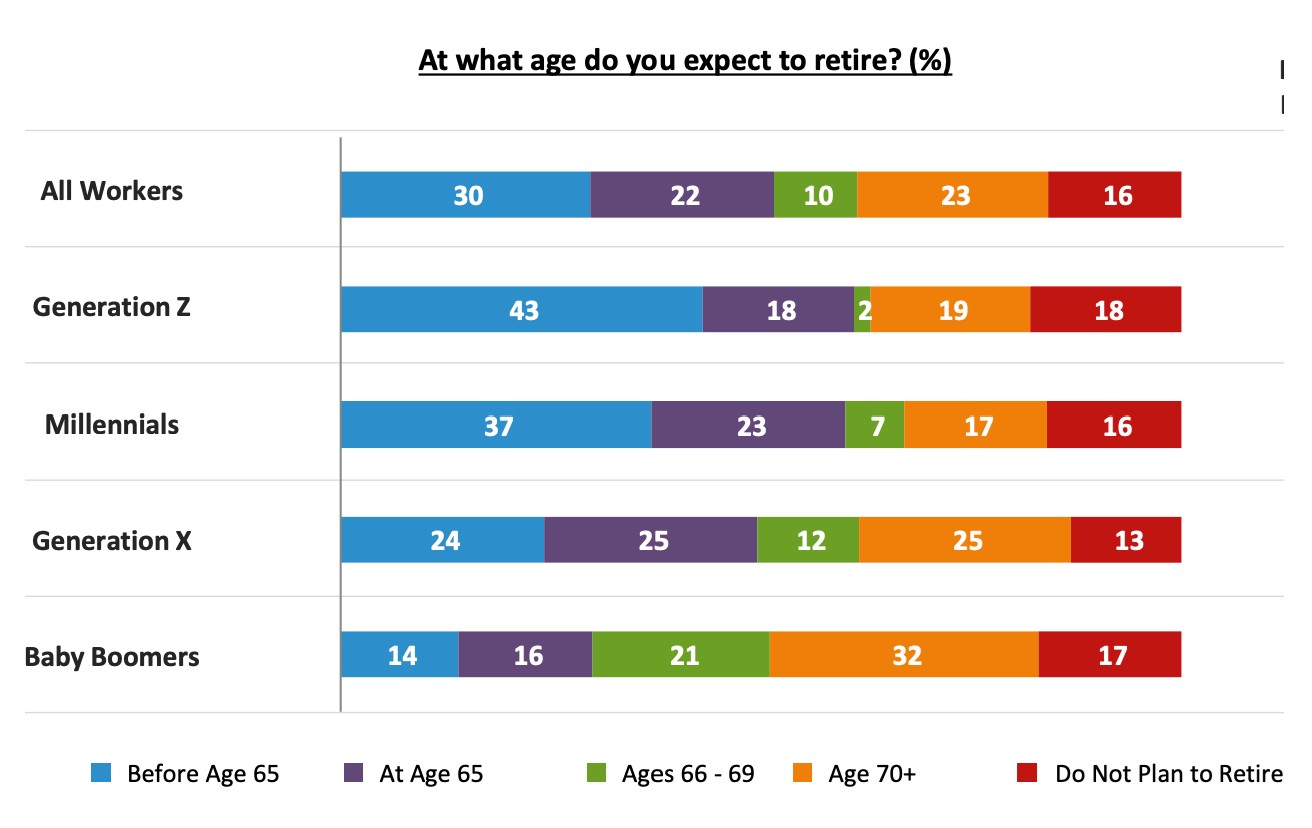In the News
WHAT THE DATA SAY: Gen Z banks on retiring early but not on Social Security
By: Ray Day
CONTACT:

- JOB, COST-OF-LIVING WORRIES UP AGAIN: Today, 86% of Americans are concerned about the economy, inflation and jobs – moderating from last week. Yet worries about affording living expenses and losing a job are on the rise again.
- 86% are concerned about the economy and inflation (down 4 points from last week)
- 82% about a potential U.S. recession (down 4 points)
- 81% about U.S. crime rates (down 1 point)
- 73% about political divisiveness (down 1 point)
- 73% about affording their living expenses (up 1 point)
- 73% about the War on Ukraine (no change)
- 57% about a new COVID-19 variant (down 2 points)
- 48% about losing their jobs (up 3 points)
- 47% about the Monkeypox outbreak (up 2 points)
- GEN Z NOT BANKING ON SOCIAL SECURITY: Of the four generational groups currently in the working world, Gen Z is the least likely to depend on Social Security to fund their retirement – and the most likely to retire early. That’s according to the “Emerging From the COVID-19 Pandemic: Four Generations Prepare for Retirement” survey released this week with the Transamerica Center for Retirement Studies.
- Gen Z workers (43%) are more likely than older generations to expect to retire before age 65 (versus 30% of all workers expecting to retire before age 65, 37% for Millennials, 24% for Gen X and 14% for Baby Boomers).
- 67% of Gen Z workers are saving for retirement through employer-sponsored 401(k) or similar retirement plans or outside the workplace.
- The median age at which Gen Z is starting to save – 19 years old – is much younger than the median starting age for Millennials (age 25), Gen X (30) and Boomers (35).
- Among Gen Z and Millennials, 73% said they are concerned that Social Security will not be there when they are ready to retire.
- That compares with 40% of Boomers who expect Social Security to be their primary source of retirement income.
- Gen X workers have the least faith in Social Security, with 78% saying they are concerned that Social Security will not be there for them when they are ready to retire.
- HIGH SCHOOLERS WANT MORE CAREER HELP: High school students across the country are frustrated with the lack of support they are receiving in preparing for a future career. Our survey with the Data Quality Campaign and Kentucky Student Voice Team found:
- 54% say the pandemic has changed how they think about what they might do after graduation.
- Only 35% say their school informed them of which postsecondary or career paths are available to them.
- 80% of students agree they would feel more confident about their career path if they had better access to information to determine their options after graduation.
- This lack of career preparation already is showing up in the workplace. Of Gen Z members who interned or started a job this past year, 49% say that they did not feel like their training and onboarding were done well.
- 58% of interns also report feeling lost at work without anyone to reach for questions and support.
- LESS THAN HALF OF VOTING AMERICA WATCHES TRADITIONAL TV: When it comes to reaching Americans this election season, less than half of voters (49%) have a traditional TV, according to a new HarrisX survey with Samba TV.
- 1 in 4 of those who do still have traditional TV plan to cancel in the next six months.
- Independents (42%) are the least likely to have traditional TVs.
- Millennial and Gen Z voters are more than twice as likely to stream than they are to have a traditional linear subscriptions today. The gap is even wider for younger voters in battleground states.
- Facebook remains the most used platform by registered voters nationally but has less of an impact in key battleground states.
- Democrat voters are significantly more likely to use TikTok than Republicans nationally –with 37% of Democratic voters using it weekly compared with 27% of Republican voters.
- MANY WOMEN STILL MISS DEADLY BREAST CANCER SIGNS: October is National Breast Cancer Awareness Month, and most women are unaware of the unusual symptoms of a particularly aggressive and deadly form of the disease, according to our survey with The Ohio State University Comprehensive Cancer Center.
- The good news: 78% of women recognize a lump in the breast as a sign of breast cancer.
- However, less than half of women would flag redness of the breast (44%), pitting/thickening of the skin (44%) or one breast feeling warmer or heavier than the other (34%) as possible symptoms of breast cancer – specifically the rare and highly aggressive form of the disease known as inflammatory breast cancer.
- ICYMI: In case you missed it, check out some of the thought-leadership and happenings around Stagwell making news:
As always, if helpful, we would be happy to provide more info on any of these data or insights. Please do not hesitate to reach out.
Related
Articles
In the News, Press Releases, Thought Leadership
Jun 10, 2025
Stagwell (STGW) Chairman and CEO Mark Penn to Discuss the Irreplaceable Power of Human Creativity on the Main Stage of Cannes Lions

Events, In the News, Press Releases, Talent & Awards
Jun 05, 2025
Code and Theory Named ANA B2B Agency of the Year After Transforming the World’s Leading Brands

In the News, Press Releases, Talent & Awards
May 19, 2025
Stagwell (STGW) Appoints Connie Chan as Chief Growth Officer for Asia Pacific





